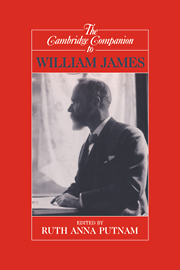Book contents
- Frontmatter
- Introduction
- 1 Pragmatism and introspective psychology
- 2 Consciousness as a pragmatist views it
- 3 John Dewey's naturalization of William James
- 4 James, Clifford, and the scientific conscience
- 5 Religious faith, intellectual responsibility, and romance
- 6 The breathtaking intimacy of the material world
- 7 James, aboutness, and his British critics
- 8 Logical principles and philosophical attitudes
- 9 James's theory of truth
- 10 The James/Royce dispute and the development of Jarnests "solution"
- 11 William James on religious experience
- 12 Interpreting the universe after a social analogy
- 13 Moral philosophy and the development of morality
- 14 Some of life's ideals
- 15 “A shelter of the mind”
- 16 The influence of William James on American culture
- 17 Pragmatism, politics, and the corridor
- 18 James and the Kantian tradition
- Bibliography
- Index
7 - James, aboutness, and his British critics
Published online by Cambridge University Press: 28 May 2006
- Frontmatter
- Introduction
- 1 Pragmatism and introspective psychology
- 2 Consciousness as a pragmatist views it
- 3 John Dewey's naturalization of William James
- 4 James, Clifford, and the scientific conscience
- 5 Religious faith, intellectual responsibility, and romance
- 6 The breathtaking intimacy of the material world
- 7 James, aboutness, and his British critics
- 8 Logical principles and philosophical attitudes
- 9 James's theory of truth
- 10 The James/Royce dispute and the development of Jarnests "solution"
- 11 William James on religious experience
- 12 Interpreting the universe after a social analogy
- 13 Moral philosophy and the development of morality
- 14 Some of life's ideals
- 15 “A shelter of the mind”
- 16 The influence of William James on American culture
- 17 Pragmatism, politics, and the corridor
- 18 James and the Kantian tradition
- Bibliography
- Index
Summary
Then for the first time did I realize the enormous capacity of the philosophic mind for misconstruing James. (Schiller 1934, 97)
G. E. MOORE'S CRITIQUE OF PRAGMATISM
Shortly after the publication of his lecture series, Pragmatism, in 1907, James's pragmatism, and in particular his pragmatic conception of truth, was subjected to some harsh examination in articles by two leading British philosophers, G. E. Moore and Bertrand Russell. These must surely have contributed significantly to the tendency, at least in Britain, to think of James as a rather second-rate thinker. For, upon the face of it, their rather commonsense objections seem quite devastating. It is only more recently, as certain philosophical trends, of a kind often described as pragmatic, have hit the philosophical headlines, that objections like those pressed by Moore and Russell have come to seem less forceful. However, I am doubtful whether even now most commentators make it quite clear what it is that is largely wrong in these criticisms.
In his address on “Professor James' 'Pragmatism'” to the Aristotelian Society in 1908 (reprinted in Moore 1922) Moore begins by painfully assembling evidence to the effect that James intends to affirm both the following two propositions.
(1) All, and only, true ideas are verifiable.
(2) All, and only, true ideas are useful.
- Type
- Chapter
- Information
- The Cambridge Companion to William James , pp. 125 - 144Publisher: Cambridge University PressPrint publication year: 1997
- 7
- Cited by

